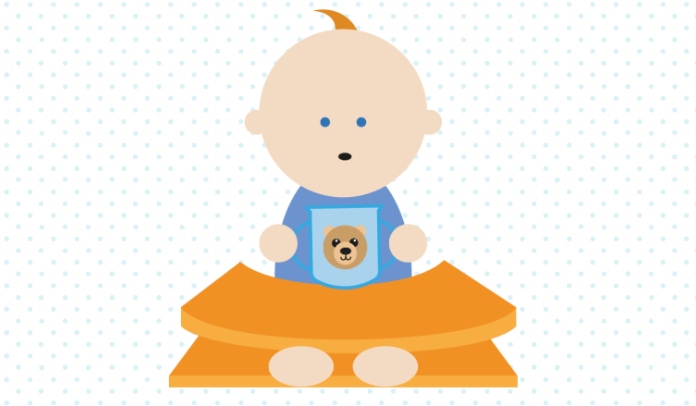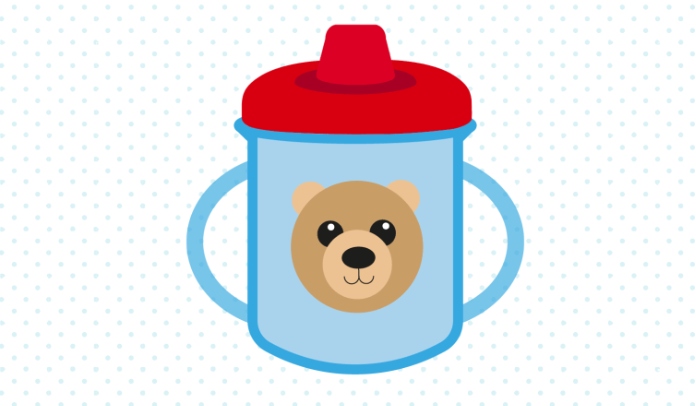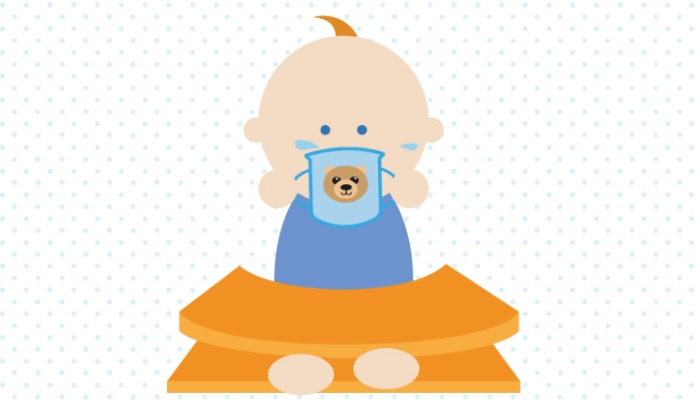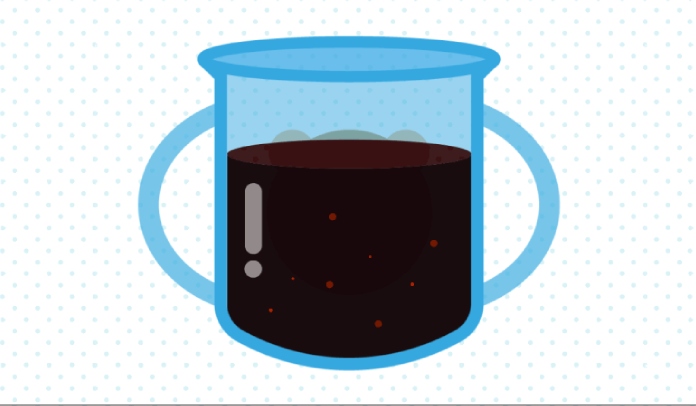























Your toddler’s developing feeding skills

Your toddler has come a long way since that first spoonful of puree went in (and probably came straight back out again!). Knowing what to expect from your toddler developmentally can help make family mealtimes more pleasant for the whole family. Here’s how you can help continue her journey towards becoming an independent, healthy eater.
3 reasons to drink from a cup

Did you know? Prolonged use of bottles is linked with a higher chance of tooth decay and becoming overweight. The American Academy of Pediatrics (AAP) recommends that toddlers be off bottles before 18 months of age.
If you haven’t already introduced your toddler to drinking from a cup, now is a good time to try.
1. By 12 months of age, most babies have the coordination skills needed to hold a cup and drink from it.
2. Your toddler is ready to drink from an open cup, rather than a lidded or sippy cup, or can even use a cup with a straw.
3. Now that your baby has reached her first birthday, she can drink whole cow’s milk, or may be
drinking growing-up milks, so it’s a good idea to introduce a cup at the same time.
Dos and don’ts when drinking from a cup

By now your toddler is enjoying her developing independence with finger-feeding. Learning to drink from a cup is one more skill for her on the path to becoming an independent eater.
Do’s Don’ts
- Do use small, toddler-sized cups and fill them up. This will make it easier to master the skill of drinking as she doesn’t have to tip the cup up too much. Don’t worry if she drops or throws her cup away once she’s finished—this is her way of telling you she has had enough to drink.
- Do be patient and allow your child plenty of practice. She’ll get there eventually. Don’t rush or pressure her to drink faster. It won’t help her develop the skill more quickly.
- Do expect spillages—especially as she learns to drink from an open cup. Spilling is likely to happen at all three stages of drinking—bringing the cup to her mouth, drinking, and taking the cup away from her mouth. Don’t get upset if she makes a mess. It’s all part of the learning experience.
- Do choose plastic, easy-to-grip cups. Don’t let her carry the cup everywhere she goes.
- Do offer a cup of water with meals and throughout the day. Don’t put her to bed with a cup.
- Do use cups that hold 120-180ml (4-6oz), which is an appropriate amount for her age and size. Don’t be concerned if your toddler doesn’t show all of these skills yet. Every child develops differently.

Be water wise
Water is…
- hydrating: As well as being involved in practically all bodily functions, water helps make sure your toddler is staying properly hydrated.
- calorie-free: Water doesn’t contain any calories, so all your toddler’s energy needs can come from nutritious foods, breast milk, and cow’s milk.
- teeth-safe Because it doesn’t contain any sugars, water won’t damage your toddler’s teeth.
Some parents and caregivers offer toddlers sugar-sweetened beverages or other soft drinks. These can
have a negative effect on your toddler’s health and teeth.
Soft drinks can be…
- high in calories Sugar-sweetened beverages contain a large number of calories. Drinking a lot of these may mean that your toddler is consuming more calories than she needs on a daily basis. This can lead to unhealthy weight gain.
- full of sugar Fizzy drinks, juice drinks, and flavored waters can contain a surprising amount of added sugar. The World Health Organization recommends reducing “free sugar” (which includes sugar in unsweetened fruit juices and smoothies) intake in the daily diets of both adults and children.
- harmful to teeth Added sugars in drinks can cause tooth decay. The bacteria naturally found in your toddler’s saliva reacts with the sugars to produce acids which can damage teeth. To help promote healthy teeth and gums, remember to brush your little one’s teeth twice a day. Use a smear (the size of a grain of rice) of fluoride toothpaste specifically made for toddlers.
Role model healthy-drinking choices. If your little one sees you enjoying water, she’s more likely to drink water too. Juice is not necessary in your toddler’s diet. Offering whole fruit is a better option. If you do decide to offer juice, follow these tips:
- Choose 100% juice and avoid “fruit drinks” and “juice drinks”, which may contain added sugar (and not much real fruit).
- Don’t give your toddler more than 120ml (4oz) of juice in one day.
- Make the juice part of a meal or snack.
Sources
- Black MM, Aboud FE. Responsive feeding is embedded in a theoretical framework of responsive parenting. J Nutr 2011; 141(3): 490-4.
- Bonuck K, Ben Avraham S, Hearst M, et al. Is overweight at 12 months associated with differences in eating behaviour or dietary intake among children selected for inappropriate bottle use? Matern Child Nutr 2014; 10(2):234-44.
- Dattilo AM Programming long-term health: Effect of parent feeding approaches on long-term diet and eating patterns. In: Early nutrition and long-term health, mechanisms, consequences and opportunities. Ed., Saavedra and Dattilo, Elsevier, 2017: 471-95.
- Gooze RA, Anderson SE, Whitaker RC. Prolonged bottle use and obesity at 5.5 years of age in US children. J Pediatr 2011; 159(3):431-6.
- Hurley KM, Cross MB, Hughes SO. A systematic review of responsive feeding and child obesity in high-income countries. J Nutr 2011; 141(3):495–501.
- Shloim N, Edelson LR, Martin N, et al. Parenting styles, feeding styles, feeding practices, and weight status in 4-12 year- old children: A systematic review of the literature. Front Psychol 2015; 6:1849. doi: 10.3389/fpsyg.2015.01849.
- Sleddens EF, Gerard SM, Thijs C, et al. General parenting, childhood overweight and obesity-inducing behaviors: a review. Int J Pediatr Obes 2011; 6(2-2): e12–27.
- Vollmer RL, Mobley AR. Parenting styles, feeding styles, and their influence on child obesogenic behaviors and body weight: a review. Appetite 2013; 71:232-41.
- World Health Organization. Guideline: Sugars intake for adults and children. Geneva: World Health Organization; 2015.
- https://www.aap.org/en-us/about-the-aap/aap-press-room/aap-press-room-media-center/Pages/Weaning-from-the- Bottle.aspx (Accessed August 8 2018)
- https://www.aap.org/en-us/about-the-aap/aap-press-room/Pages/American-Academy-of-Pediatrics-Recommends- No-Fruit-Juice-For-Children-Under-1-Year.aspx(Accessed August 8 2018)